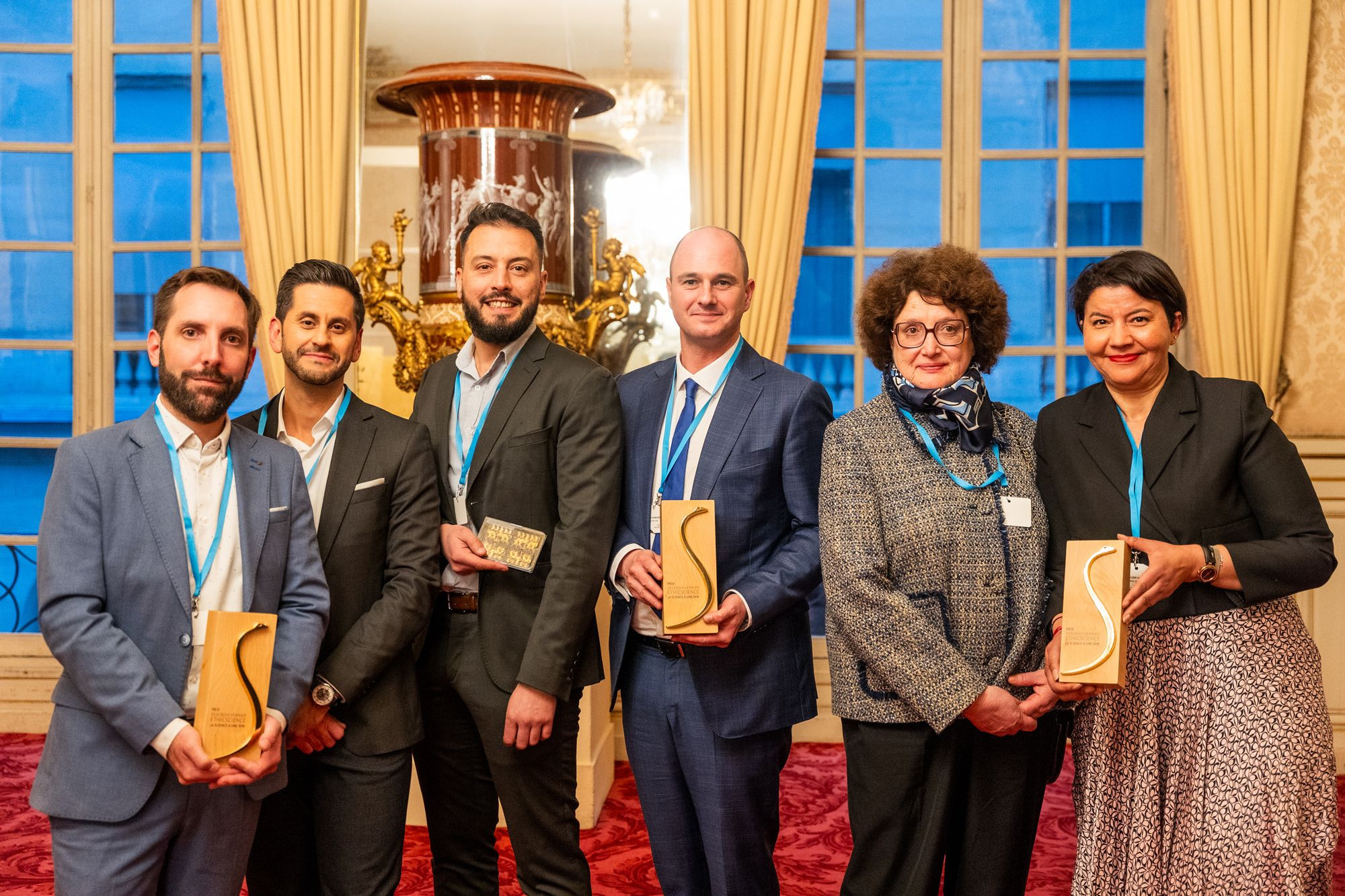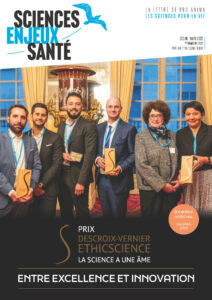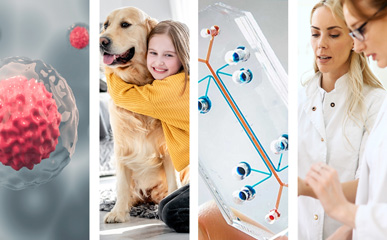
Discover the laureates of the 2025 DVES Prize, The importance of accessible NAMs training, NAMs for the assessment of data-poor chemicals and more
News on non-animal methods
APRIL 07-11, 2025NEWS, REPORTS & POSITION STATEMENTS
1. Modernizing toxicology : The importance of accessible NAM training
Current toxicology curricula and certifications are heavily reliant on animal-based research and lack mandatory education and training in New Approach Methodologies (NAMs). Traditional animal-based toxicological methods come with many concerns, including translatability and reproducibility, which NAMs are aptly positioned to address.
The NAM Use for Regulatory Application (NURA) program aims to bridge this educational gap by providing training to toxicologists, method developers, regulators, and legislators on the use of NAMs, helping to build confidence in NAM use and facilitate the shift to more human-based methods.
2. How ‘animal methods bias’ is affecting research careers
Dr Catharine Krebs, the medical-research programme manager for the PCRM, a non-profit organization in Washington DC that advocates for alternatives to animal-based research, together with other attendees at a 2022 workshop coined a term that helped to make sense of what she’d noticed as a researcher : animal-methods bias, as indicating “a reliance on or preference for animal-based methods despite the availability of potentially suitable non-animal-based methods”.
In an article in Nature, these kinds of issues with journal or grant reviews, and unconscious biases, are discussed through interviews with young researchers, and other experts. To mitigate this kind of bias, the Coalition to Illuminate and Address Animal Methods Bias (COLAAB) has developed a database of journals that have published NAM studies alongside an editor outreach project to better understand how journal editors approach NAMs and to suggest practical interventions.
3. EU roadmap for phasing out animal testing for chemical safety assessments : Recommendations from a multi-stakeholder roundtable
The European Commission is committed to developing a roadmap to eliminate the use of animals for the safety testing of chemicals. Five animal protection NGOs organised a roundtable in June 2024 to support this effort, bringing together experts from different fields.
Discussions covered revising current chemicals legislation, accelerating the acceptance of non-animal methods, creating EU databases to improve data sharing, strengthening cooperation and communication, building skills and expertise in non-animal methods, monitoring progress and increasing funding. A new report summarises the main ideas and recommendations from the roundtable to help guide the Commission’s work on the roadmap.
4. 2024 ECVAM Status Report : biotechnology boom accompanies continuous drop in animal testing
The annual status report of the JRC’s EU reference laboratory for alternatives to animal testing (EURL ECVAM) highlights recent EU statistics which show that the biotechnology sector has experienced rapid growth, with cutting edge technologies and innovation transforming many domains including biomedical research, development of medicines and in vitro testing.
Standards are needed to foster a robust biotech ecosystem and facilitate technology transfer from research to industry. ECVAM’s work has been instrumental in driving standardisation efforts in the in vitro biotech sector, including contributing to the CEN-CENELEC Focus Group on Organ on Chip.
Validation is essential for the development of standard tests using non-animal methods. To ensure an internationally recognised and harmonised approach, ECVAM is co-leading the project to revise the OECD Guidance Document (no. 34) on the validation and international acceptance of new or updated test methods for hazard assessment.
INTERVIEWS, NOMINATIONS & AWARDS
5. The Descroix-Vernier EthicScience Prize (DVES): Laureates of the 2025 edition
On 28 March 2025, the Comité Scientifique Pro Anima and the Fondation Descroix-Vernier awarded three of the most innovative and promising scientific projects using non-animals methods for biomedical research. The ceremony was held under the patronage of French Senator Arnaud Bazin at the prestigious Palais du Luxembourg, in Paris.
Bringing together more than a hundred guests representing the wealth and complementarity of the different health sectors (toxicology, biomedical research, veterinary medicine, cosmetics) and the civil society, the ceremony unveiled the winning projects of this 2025 edition, celebrating cutting-edge biomedical research aiming to provide a better response to the human and global health challenges of the 21st century.
Discover winners of the DVES 2025 edition
6. International 3Rs Prize
Have you published a paper that describes outstanding and original work that has or could have major impacts on the replacement, reduction or refinement of the use of animals in research ? If so, then you should apply for the annual NC3Rs 3Rs Prize which is co-funded by GSK to recognise a paper published in the last three years with demonstrable 3Rs impacts.
This prestigious award consists of a £28k prize grant and a £2k personal award. Where a publication is highly commended by the Panel, a £4k prize grant and £1k personal award may also be awarded. The Prize is awarded to an individual who may be the Principal Investigator, research lead or any other author. Any researcher in academia or industry, in the UK or overseas is eligible.
TOOLS, PLATFORMS, CALLS
7. EUROoCS Board Expansion and Elections 2025
The EUROoCS Board will be expanding this year with four new board members, including the Vice-Chair.
If you are a EUROoCS member with an active membership and are interested in the position of Board Member or Vice-Chair, you can send your CV (max 2 A4) and a motivation letter (max 300 words) to contact@euroocs.eu with the subject ‘Elections 2025’ by April 25th, 2025. The EUROoCS Board will present a list of nominations for election, and voting will be conducted electronically via e‑voting. The new Board members will be introduced during the EUROoCS Members Meeting at the MPS World Summit 2025.
8. EUROTOX Early Career Exchange Program : application open
The EUROTOX Early Career Exchange Program (ECEP) is meant to foster career development by providing support to talented and ambitious early career researchers to get an additional experience in toxicology. Successful applicants will have the opportunity to learn new scientific techniques, approaches to data analysis and to gain regulatory knowledge, to have networking opportunities for establishing new collaborations and to experience different working cultures and research environments. The program is expected to be an involvement in a project, research or experimental experience rather than participation in a course.
The deadline to submit applications is April 30, 2025.
INDUSTRY, BIOTECH & PARTNERSHIPS
9. NETRI announces the acquisition of the assets of HCS pharma to strengthen its platform for adverse events in oncology
On 25 March 2025 the industrial start-up NETRI specialising in organs-on-a-chip combined with AI, announced the acquisition of the assets of HCS PHARMA. NETRI will now be able to enhance its offer by coupling its platforms (NeuroFluidics DuaLink Well & more) with the hydrogels developed by HCS PHARMA to enable complete innervation and vascularisation of any spheroid or organoid of human origin.
This strategic operation is fully in line with NETRI’s development plan and strengthens its technological offering by integrating patented innovations in the field of biomaterials and advanced cellular models.
Read more (FR)
SCIENTIFIC DISCOVERIES & PROTOCOLS
10. Integration of new approach methods for the assessment of data-poor chemicals
A NAM-based assessment case study was recently conducted via the Accelerating the Pace of Chemical Risk Assessment initiative, a consortium of international research and regulatory scientists. The primary objective was to develop a reusable and adaptable approach for addressing chemicals with limited traditional toxicity data using a NAM-based point-of-departure (POD), bioactivity:exposure ratio (BER), and bioactivity-based flags for indication of putative endocrine, developmental, neurological, and immunosuppressive effects via data generation and interpretation for 200 substances.
This work demonstrates the feasibility of using a battery of toxicodynamic and toxicokinetic NAMs to provide a NAM-based POD for screening-level assessment.
11. Patient-derived glioblastoma organoids as real-time avatars for assessing responses to clinical CAR‑T cell therapy
Patient-derived tumor organoids have been leveraged for disease modeling and preclinical studies but rarely applied in real time to aid with interpretation of patient treatment responses in clinics.
In a new study, researchers analyzed six sets of patient-derived glioblastoma organoids (GBOs) treated concurrently with the same autologous CAR‑T cell products as patients in a phase 1 of clinical study. They found that CAR‑T cell treatment led to target antigen reduction and cytolysis of tumor cells in GBOs, the degree of which correlated with CAR‑T cell engraftment detected in patients’ cerebrospinal fluid (CSF). Furthermore, cytokine release patterns in GBOs mirrored those in patient CSF samples over time.These findings highlight a unique trial design and GBOs as a valuable platform for real-time assessment of CAR‑T cell bioactivity and insights into immunotherapy efficacy.
Read the publication in Cell Stem Cell


